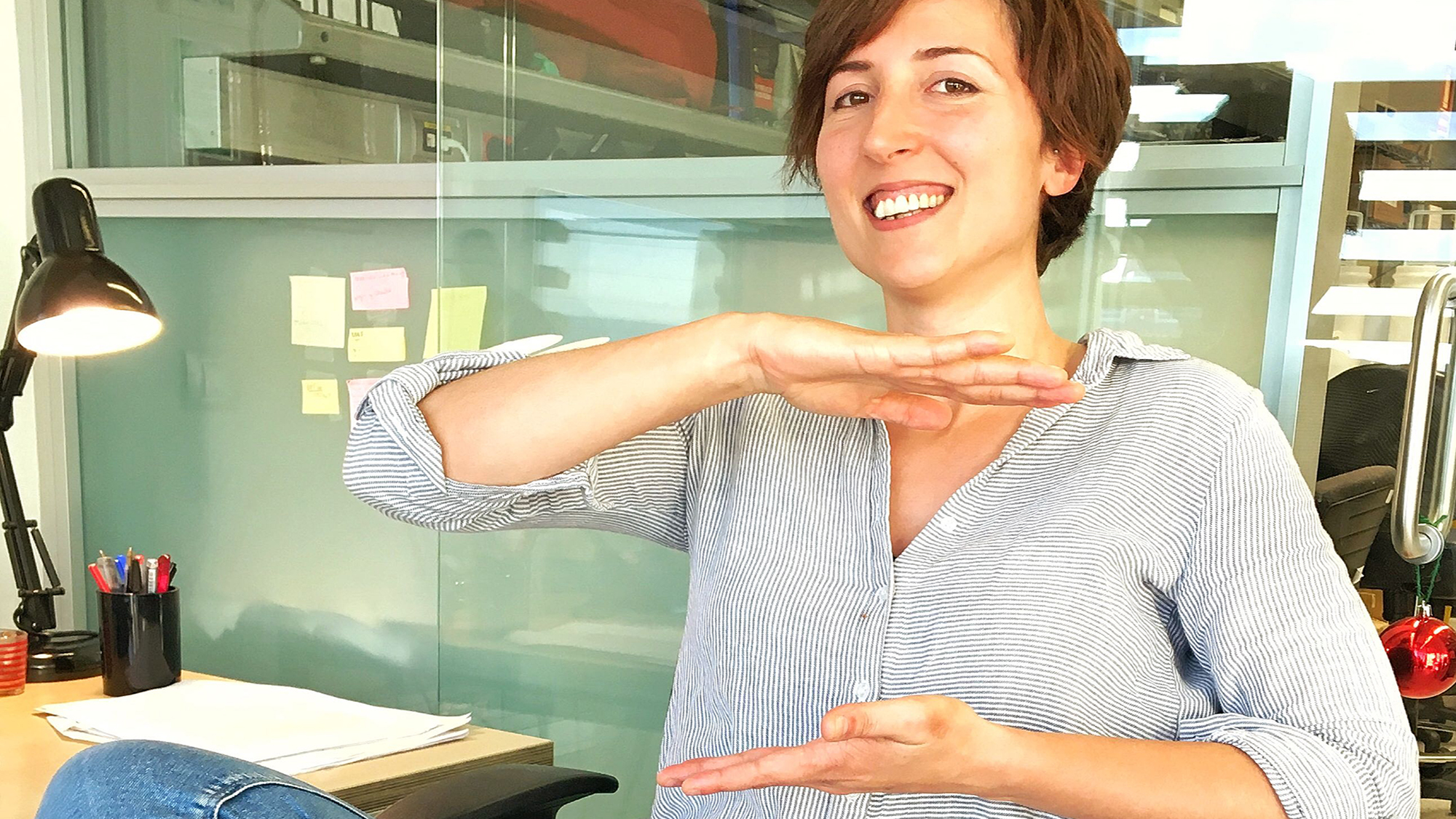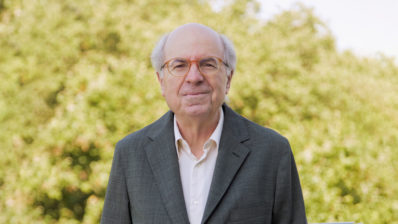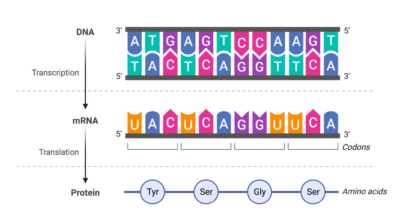Eva Maria Novoa was born in Barcelona 36 years ago. Here she started her career and, after moving around the world — she has worked in the United States, as well as in Australia — she came back to her hometown, where she leads the research group on Epitranscriptomics and RNA Dynamics at the Centre for Genomic Regulation (CRG), since September 2018. She likes playing the piano and enjoys playing beach volleyball, drinking a glass of wine with her friends, and traveling with her family on the weekends.
What degree did you study?
I combined two years of the Biology degree with two more years of the Biochemistry degree at the University of Barcleona (UB). Despite the 4 years degree — by then, the common duration of a degree was 3 years —, the Bologna Plan was in place, so it was mandatory to do a one or two-year master’s degree before starting the PhD.
And you jumped into bioinformatics.
Many friends of mine did one-year masters in which they basically repeated what they had learned in the degree! Since we had to do it, many chose the shortest and easiest option. Despite being a tempting option, I found it a waste of time, and thought that since I was forced to do it, it would be best if I at least learned something new. A friend of mine told me that surely, due to my personality, I would be good at programming, so I decided to start a Masters in Bioinformatics at the Pompeu Fabra University (UPF), even though it was a two-year masters. I learned programming, but also a lot of mathematics, statistics, data analysis… I really liked it and it was very useful; I think I studied more during the first year of my masters than during the whole degree! It was quite new… Interestingly, now I am working here, in the Barcelona Biomedical Research Park (PRBB), where there are many of the researchers who used to be my teachers!
So you don’t regret it.
It was a random decision, but it changed my entire professional career! Afterwards I have done both wet lab (experimental work) and dry lab (computational work), and I prefer the second one. Nowadays, bioinformatics is something essential. In my laboratory, most of my students are experimental biologists, but I tell them from the beginning that they must learn programming. I think that in our field you cannot depend only on collaborators, you have to know a minimum of bioinformatics yourself.
When you finished your master’s degree, you did your PhD at IRB and then you moved to the United States.Yes, I did a postdoc at MIT, in the Computational Biology Laboratory led by Manolis Kellis. I stayed there for two years — joining two different scholarships— and then I decided to dedicate the third year of the Human Frontiers (HFSP) scholarship to continue my postdoc in the other part of the world, Australia. The main reason for this change was that I wanted to investigate in a laboratory where it was possible to carry out computational but also experimental work. During my stay at MIT I realized that, at least for me, it is essential to have a laboratory in which to carry out experiments and thus test the hypotheses that arise from the analysis of data that you do using bioinformatics. I believe that the combination of wet and dry lab is essential for a laboratory to be highly efficient.
“For me, it is essential to have a laboratory in which to carry out experiments and thus test the hypotheses that arise from the analysis of data that you do using bioinformatics.”
Why did you decide to come to the CRG?
I wanted to come back home, but I was very comfortable in Australia as well. I only applied for this position at the CRG because I was interested in genomics and bioinformatics and the CRG stands out in both fields. If I wouldn’t have got this position, I would have stayed in Australia.
But you got the position… And not in the easiest conditions!
Yes, just two days before coming to do the interview at the CRG… I found out I was pregnant! I had just been offered a job as a group leader in Australia as well, and I stayed a while longer there — all my pregnancy and the first 6 months of my daughter Irene, when I was on leave. We came here right after that.
It is obvious that starting your own laboratory has been hard.
Starting your own group is always a challenge, and doing it with a baby, even more… Without the support of my family, who lives here, it would have been almost impossible. In addition, economically it has not been easy, for bureaucratic reasons. When coming to Barcelona our daughter was only 7 months old and my husband has dedicated himself to taking care of her all this first year. But since we were coming from Australia, he was not receiving unemployment pay, neither there nor here. And for the first nine months I was considered not yet a resident, and had to pay the maximum amount of taxes.
The truth is that, in hindsight, I would not recommend the experience of finishing maternity leave and starting your own laboratory right away. I would have taken three more months, to organize myself. I had to pack and unpack, move and start an entire laboratory on the other side of the world, all while I was still on maternity leave!
Do you think that more facilities should be provided when you have children?
In Australia they offer you 6 months of maternity leave; and if you have spent 5 years working at the university, you are entitled to a whole year! Here you have about 4 months. Things are getting better, they have increased parental leave, too, but there’s a lot of work to do.
Still in no time, you already have a group of 8 people!
Four of them already came with me from Australia, two PhD students, a technician, and a bioinformatician.
Did you already have people in your charge there?
Yes, I could say that I started “training” myself as a group leader during my last year there. They have a type of intermediate position where you are independent, you have your own students and scholarships, but you are in the group of a more senior principal investigator, which gives you some stability and peace of mind.
An ideal situation … And what do you expect now from your group? Do you want it to grow?
Perhaps it would be nice to have a few less students and some more postdocs, for a better balance. But at the moment I have received many requests from predocs and very few from postdocs. I think it is difficult to get good postdocs interested in coming to a group that is just starting… They usually want to go to more established and renowned laboratories. Leszek’s case, my only postdoc, is special because we met at a conference and our interests were very aligned.
What do you like most about your job?
For me, the best thing about research is how fun it is to investigate and how wonderful it is to find answers to the mysteries that fascinate us. Of course, in the day to day we do not always find answers to the “great mysteries”, but we do find the little ones, and one day, suddenly, perhaps you have found the answer to one of the great questions.
“For me, the best thing about research is how fun it is to investigate and how wonderful it is to find answers to the mysteries that fascinate us“
What would you change in the academic world?
The balance of personal life and work. It is true that there is increasing awareness of how important it is to have a good “work-life balance”, and institutes, such as the CRG, increasingly incorporate more measures to help maintain this balance. Unfortunately, we live in a competitive world where your success as a principal investigator (or as a postdoc, predoc, etc.) is measured by your publications. And if someone goes ahead and publishes what you were preparing while maintaining a good balance of personal and work life… Well, next time you may not focus that much on that balance, because the future scholarships you get depend on these publications. The problem, therefore, is the publication and evaluation system that rewards only those who come first in the race. And this is a serious error, since it causes that certain experiments sometimes are not done with all the necessary controls, or that even in some extreme cases there are publications with manipulated data. But apart from the scientific problems associated with this “race to be the first”, this system also makes researchers have a worse balance of personal and professional life than people who work in other professional areas.
“The race to publish first worsens both the quality of the research and the personal and professional balance of life of the researchers”
What would be your advice for a person who is considering doing research?
There are many types of advice that could be given. But if I have to stick to one, I would tell them to ask themselves before embarking on this adventure, “Why do I want to investigate?”. The answer should not be salary, prestige, or the balance of personal and work life. It should be because you are passionate about science, solving mysteries, and you want to dedicate your effort and time to advance in the knowledge of a scientific field that fascinates you. So my advice would be precisely this: don’t forget why you do research, and choose a research group and a scientific question that fascinates you.







